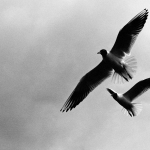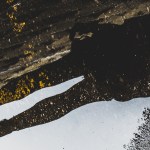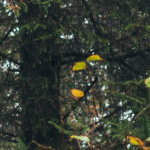Louise stirred the tea in endless circles. The spoon looked like a glistening silver oar getting lost in an amber cyclone. Did she stir with the current or against it? It was the third cup she had poured that morning, each time filling the thin porcelain a little closer to the rim.
Pace yourself, Lou. Pace. Little reminders were enough to rein her in; to keep the sipping—the thirsty swallows—at an even tempo. The first cup always went down quickly as she tried to desperately fill the growing hole that sat below her ribcage. At first, the one cup was enough to rub off some of the edge. But as the hole grew with time, Louise began to consume a second cup. And then a third.
Something had broken through her thoughts. She had lost track of how long she’d been sitting at the dining room table, but it must’ve been a longer time than she intended because the storm outside had cleared and the early evening light crept in through the windows, tip-toeing around the dust particles in the air. She had just finished what had been her third cup of morning tea, but somehow it was already 5 p.m.
It happened sometimes, where her mind wandered while her hand continued to move, rhythmically stirring. The taste of milk couldn’t be too milky. The sugar cube had to disintegrate completely. She hated the crunch between her teeth when she’d take a sip. She hated her sister’s ashes sticking to the back of her throat like wet sand at the beach.
In retaliation against the morsel of sugar Louise suddenly caught in her mouth, she crunched so hard that she bit the inside of her cheek. Her tongue reflexively flicked at the wound, tasting metallic warm iron against taut muscle. She imagined Laura sitting on the edge of her tongue, her sister patting the wound dry.
She wasn’t supposed to be lonely, that was the deal with being a twin. Braided umbilical cords, genes coiled tightly together in the womb as they slowly separated, not wholly one person; not entirely two separate people. She remembered the fabled story of how they both emerged from between their mother’s legs, screaming and holding hands.
Louise drained the cup and set it gently on the saucer. Placing the lid back on the urn, she stood up from the table and held it to her chest. Returned to the mantle among old framed family photos, the urn sat lighter than it did the day before.
…
Biography
Nikoletta Gjoni is a fiction and creative nonfiction writer living outside of Washington, DC. She currently has a collection of linked short stories out on submission about people living in Communist Albania, spanning the 1970s through to the present day. Her work can be found or is forthcoming in Kindling Volume III, Cleaver Magazine, Cotton Xenomorph, and Riggwelter Press. Her first published story was nominated for the 2018 PEN/Robert J. Dau prize. You can follow her on Twitter @NikiGjoni.
Image: loli Clement





